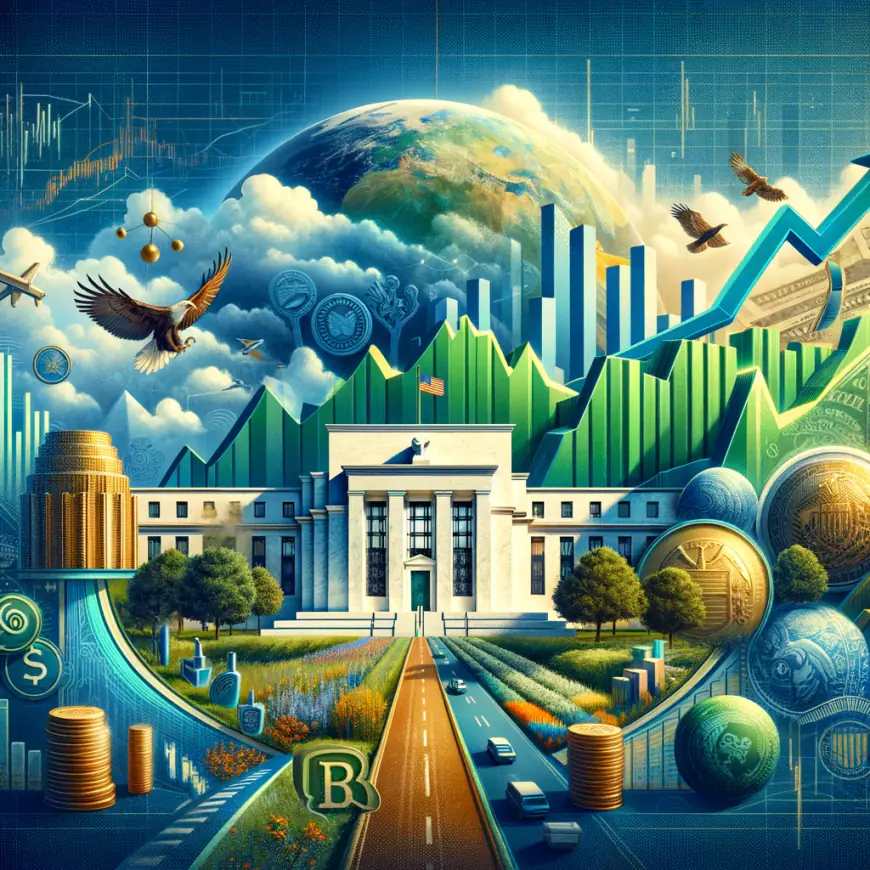U.S. economy’s growth forces Fed to rethink rate cut strategy
The tables have turned for the U.S. economy, leaving everyone wide-eyed and bushy-tailed. Gone are the days when the U.S. was the delicate flower of the global garden, wilting without the Federal Reserve’s nurturing low rates. Recent data throws a wrench in the works, showing an economy that’s not only standing tall but also flexing […]

The tables have turned for the U.S. economy, leaving everyone wide-eyed and bushy-tailed. Gone are the days when the U.S. was the delicate flower of the global garden, wilting without the Federal Reserve’s nurturing low rates. Recent data throws a wrench in the works, showing an economy that’s not only standing tall but also flexing its muscles, forcing the Fed to second-guess its plans for cutting rates sooner rather than later.
The Tug-of-War: Growth vs. Interest Rates
It’s a bit of a spectacle, really. On one side, you’ve got the U.S. economy, doing its best impression of an overachiever by dodging the recession bullet and eyeing what experts like to call a “soft landing”. This isn’t just a fluke or a one-off; forecasters are putting their money where their mouth is, with confidence levels reaching a new high. According to the wise folks who participated in the CNBC Fed Survey, the likelihood of the U.S. economy achieving a soft landing is now more than a coin toss at 52%, a notable jump from previous guesses.
But there’s more. The same experts are seeing a recession’s chances dwindling faster than ice cream on a hot day, down to 32% from earlier gloomier estimates. This isn’t just good news; it’s like finding out your lottery ticket is a winner, twice.
On the flip side, the Federal Reserve, that ever-so-cautious guardian of the economy, is caught in a bit of a pickle. With the economy showing off its resilience, the pressure’s on to keep interest rates steady at the sweet spot of 5.25% to 5.5%. The central bank’s bigwigs are likely scratching their heads, wondering if they can stick to their guns without putting a damper on the party.
A Closer Look at the Crystal Ball
Forecasting the economy’s future is a bit like trying to predict the weather in a city with all four seasons happening in one day. It’s tricky, and forecasters have had their share of oops moments, especially with the whole recession prediction saga. Yet, here we are, seeing a brighter outlook with fewer clouds of doom on the horizon.
Interestingly, while some are still hedging their bets on a downturn, the consensus is leaning towards optimism. The expectation of rate cuts has somewhat cooled, with an average prediction of three snips to the interest rate this year. However, not everyone’s singing from the same hymn sheet, with opinions divided on just how hawkish the Fed might get.
The inflation forecast adds another layer to this complex cake. While growth is on the menu, inflation is expected to be less of a party crasher, gradually coming down to more palatable levels. Yet, this balancing act between fostering growth and taming inflation is no small feat, and the Fed’s playbook seems to be under constant revision.
The unemployment rate’s forecast to play it cool, staying in the not-too-hot-not-too-cold zone, which should give the Fed some breathing room. Yet, the million-dollar question remains: How will the Fed juggle the need to keep inflation in check without throwing cold water on economic growth?
Equities, always a sensitive barometer of economic sentiment, seem to be in a state of cautious optimism. While some see them as slightly overpriced, the outlook isn’t exactly bleak. The bond market, with its steady-as-she-goes vibe, continues to be a safe haven for those wary of equity’s rollercoaster emotions.
So, what’s the Fed to do? With the economy being the way that it is, the pressure’s on to adapt, evolve, and maybe, just maybe, rethink the playbook. The stakes are high, and the world’s watching. Chop chop, guys!
What's Your Reaction?









































































































